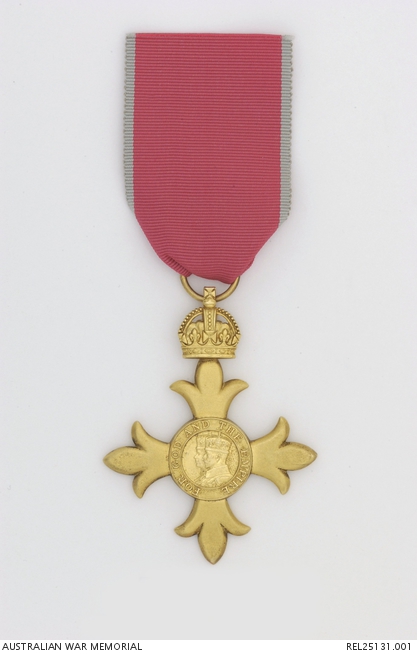| Place | Oceania: Australia |
|---|---|
| Accession Number | REL25131.001 |
| Collection type | Heraldry |
| Object type | Award |
| Physical description | Silver gilt |
| Maker |
Unknown |
| Place made | United Kingdom |
| Date made | c 1967 |
| Conflict |
Period 1960-1969 |
Officer of the Order of the British Empire (Civil) : F P Clune

Officer of the Order of the British Empire (Civil Division). Unnamed as issued.
Francis Patrick Clune was born in Sydney in 1893. He left school at the age of 14, and held a wide variety of jobs before joining the US Army in 1911. After deserting from this force, he found employment as a merchant seaman, but enlisted in the AIF on 12 May 1915. As number 2460 he joined the 7th Reinforcements to 16 Battalion, arriving on Gallipoli on 2 August 1915. After only five days with his unit, he was wounded by shrapnel in both legs on 7 August, and evacuated to Egypt. Owing to the seriousness of his wounds, he was returned to Australia and discharged in Sydney on 29 March 1916. Between the wars, and despite his minimal education, he developed a successful career as a writer. During the Second World War, Clune was appointed an Australian Comforts Fund representative, with officer's status (his rank of Major was apparently 'self-conferred') attached to the AIF overseas. He embarked for the Middle East on 5 January 1942, returning to Australia in May of the same year. On 1 January 1967, he was appointed an Officer (Civil Division) of the Most Excellent Order of the British Empire, for Services to Literature. Author of nearly sixty highly successful books, Frank Clune died in Sydney in March 1971. The citation for his OBE reads as follows: 'As the author of more than fifty books, Mr Clune is one of Australia's best known writers. His writings about many aspects of Australian life and history have done much to spread an understanding and appreciation of this country. Throughout his life, Mr. Clune has assisted many worthy causes. He donated all his royalties for one book to the Australian Comforts Fund, for which he also raised many thousands of pounds by public lectures. He was for a time honorary organiser of the Blind Book Society and he has been personally responsible for successful appeals for other deserving charities'.
- 1914-15 Star : Private F P Clune, 16 Battalion AIF
- British War Medal 1914-20 : Private F P Clune, 16 Battalion AIF
- Victory Medal : Private F P Clune, 16 Battalion AIF
- Africa Star : Honorary Commissioner F P Clune, Australian Comforts Fund
- British War Medal 1939-45 : Honorary Commissioner F P Clune, Australian Comforts Fund
- Australia Service Medal : Honorary Commissioner F P Clune, Australian Comforts Fund
- Queen Elizabeth II Coronation Medal (replica) : F P Clune